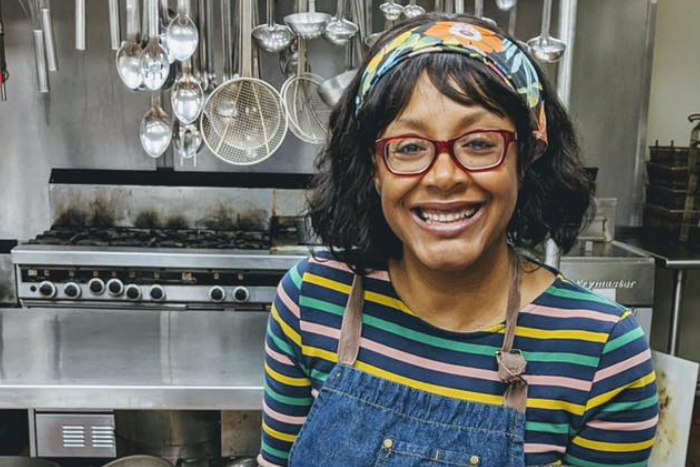
Chef and food blogger Marisa Baggett lives in Memphis, TN, where she teaches sushi workshops, caters, and creates kosher sushi for special events. She’s author of the cookbooks Sushi Secrets: Easy Recipes for the Home Cook and Vegetarian Sushi Secrets: 101 Healthy and Delicious Recipes. We caught up with her to talk about her amazing journey as a Jew and chef.
ReformJudaism.org: What can you tell us about the trajectory of how you became a Jewish chef?
Marisa Baggett: When I was about 20, I had this recurring dream: I was walking down a path that led to a wrought iron gate covered in ivy that concealed a Star of David. Behind the gate stood beautiful building that I imagined was a synagogue. I just had this nagging feeling that I was meant to Jewish, but I didn’t act on it because I didn't know anyone in Mississippi who was Jewish – or if it was even possible to become a Jew.
Several years later, after having moved to Memphis, I told a friend about the dream, and she introduced me to a rabbi. I started taking some classes, slowly became part of the community, and eventually converted to Judaism. That was 16 years ago, and it’s hard for me to think of myself as ever having been anything other than Jewish.
My interest in becoming a chef started when I was in high school. My parents said I would have to pay for my own insurance if I wanted a car, so I took an after-school job as a dishwasher at a Chinese restaurant. That’s when the bug hit me; I just knew that my future was in the restaurant business.
You started your own catering company at age 22, and you became the first African American woman to graduate from the California Sushi Academy. To what do you attribute your pioneering and entrepreneurial spirit?
My dad was always saying to me, “I don't know what it is about your personality, but you always choose to do the hardest thing.” I just like a challenge, and I don’t shy away when I see an opportunity that others miss or make excuses for why it can’t be done.
What’s the backstory of your decision to start Zayde’s NYC Deli in Memphis?
Coming home from work at Temple Israel on Fridays and not always having the time to cook a proper Shabbat meal, it occurred to me that somebody should start a service that delivers Shabbat meals – from soup to dessert.
I figured it would take me almost as much time and effort to cook dinner for 20 as it did for just my husband and me, so about a year ago, I decided to initiate this service as a fun project – never thinking it would grow into the full-fledged business.
Today, in addition to Shabbat meals, we also cater Passover seders and other holidays, celebrations, gatherings, and other events, and not only in the Jewish community.
What are some of your most popular deli and a la carte menu items?
We sell quite a bit of corned beef and pastrami, and about a year ago we added turkey pastrami, which has become a bestseller. Our challah dog is an immensely popular as well: Imagine an all-beef hot dog baked inside sweet challah with a pop of salt on top.
For the Shabbat meal menu, chicken schnitzel tops the list. A close second is our cholent pot pie, which is a fun twist on a classic Ashkenazi Shabbes dish. Each single-portion pie, filled with barley, beans, potatoes, carrots, brisket, chicken, and salami, comes with a salad and a couple of side dishes.
Your menus often include dishes from Mexico, Thailand, Japan, Israel, and other countries around the world. Is your intention to send a message with food?
When you share foods from other culinary traditions, it’s like a practical anthropology lesson. You learn a lot about that person and his or her culture and how we are different but also fundamentally the same. In this way, food can be an equalizer.
Here is a recipe for Marisa's easy chicken kreplach dish, pasta dumplings using leftover chicken.
Related Posts

9 Jewish Activities to Try When You’re at Home with Kids

Reflection, Discussion, and Action: Jews of Color Fellowship


